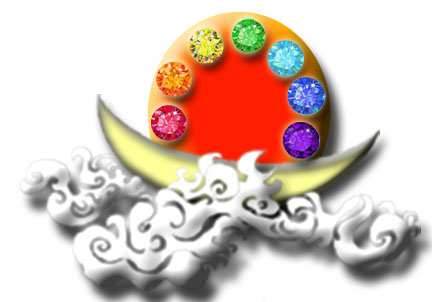
Attached is the main sutra that you can download and use to join in your own chanting for the Buddha Master and Buddha Mother. This sutra is chanted with other sutras and chants and just the Buddha’s name and Namo Kuan Sher Yin Pu Sa and requests that they return asap. The Dharma Assemblies at the Holy Miracles Temple are usually at 10:00 am, 3:00 and 7:00 pm daily with continual chanting the rest of the time 24/7. I do not know how long this will continue, but I think for some time. Our chanting nuns are hoarse and not well, so we have not yet started our scheduled zoom chants. We will do that as soon as we are able and provide the Chinese (with Pinyin) as it is chanted at the Holy Miracles Temple.
Wondrous Dharma Lotus Flower Sutra: “The Gateway to Everywhere of the Bodhisattva He Who Observes the Sounds of the World”
At that time the Bodhisattva Inexhaustible Mind (Aksayamati) straightway rose from his seat and, baring his right shoulder and facing the Buddha with palms joined, said:
“O World-honored One! For what reason is the Bodhisattva He Who Observes the Sounds of the World (Avalokitesvara) called Observer of the Sounds of the World?”
The Buddha declared to the Bodhisattva Inexhaustible Mind, “Good man, if incalculable hundreds of thousands of myriads of millions of living beings, suffering of myriads of millions of living beings, suffering pain and torment, hear of this Bodhisattva He Who Observes the Sounds of the World and single-mindedly call upon his name, the Bodhisattva He Who Observes the Sounds of the World shall straightway heed their voices, and all shall gain deliverance.
“If there is one who keeps the name of this Bodhisattva He Who Observes the Sounds of the World, even if he should fall into a great fire, the fire would be unable to burn him, thanks to the imposing supernatural power of this bodhisattva.
“If he should be carried off by a great river and call upon this Bodhisattva’s name, then straightway he would find a shallow place.
“If a hundred thousand myriads of millions of living beings enter the great sea in quest of gold, silver, vaidurya, giant clamshell, agate, coral, amber, pearl, and other such gems, even if a black wind blows their ship away, carrying it off and plunging it into the realm of the raksasa-ghosts, if there is among them but one man who calls upon the name of the Bodhisattva He Who Observes the Sounds of the World, those men shall be delivered from the troubles [caused by] the raksasas. It is for this reason that he is called Observer of the Sounds of the World.
“If again, a man who is about to be murdered calls upon the name of the Bodhisattva He Who Observes the Sounds of the World, then the knives and staves borne by the other fellow shall be broken in pieces, and the man shall gain deliverance.
“If there should be a thousand-millionfold world of lands filled with yaksas and raksasas who wish to come and do harm to others, if they should but hear the name of the Bodhisattva He Who Observes the Sounds of the World, these malignant ghosts would not be able even to look upon those others with evil eye, how much the less to inflict harm on them!
“Even if there is a man, whether guilty or guiltless, whose body is fettered with stocks, pillory, or chains, if he calls upon the name of the Bodhisttva He Who Observes the Sounds of the World, they shall all be severed and broken, and he shall straightway gain deliverance.
“If in a thousand-millionfold world of lands full of malicious bandits there is a merchant chief whose men are carrying precious gems over a road by a steep drop, if there is among them one man who makes this proclamation: ‘Good men, do not let terror take possession of you! You all must single-mindedly call upon the name of the Bodhisattva He Who Observes the Sounds of the World. For that Bodhisattva can confer fearlessness upon living beings. If you all call upon his name, then from these malicious bandits you shall contrive to be delivered; and if the multitude of merchants, hearing this, speak these words in unison, saying, ‘Namo Bodisattvaya He Who Observes the Sounds of the World!’ then, by the mere calling upon his name, they shall forthwith gain deliverance.
“Inexhaustible Mind, the imposing, supernatural power of the Bodhisattva He Who Observes the Sounds of the World is as sublime as this!
“If there are beings of much lust who are constantly mindful of and humbly respectful to the Bodhisattva He Who Observes the Sounds of the World, they shall straightway contrive to be separated from their lust. If those with much anger are constantly mindful of and humbly respectful to the Bodhisattva He Who Observes the Sounds of the World, they shall straightway contrive to be separated from their anger. If those of much folly are constantly mindful of and humbly respectful to the Bodhisattva He Who Observes the Sounds of the World, they shall straightway contrive to be separated from their folly. Inexhaustible Mind! Such imposing supernatural power has the Bodhisattva He Who Observes the Sounds of the World, so many are the benefits he confers! For this reason the beings should ever bear him in mind.
“If there is a woman, and if she is desirous and hopeful of having a son, making worshipful offerings to the bodhisattva He Who Observes the Sounds of the World, she shall straightway bear a son of happiness, excellence, and wisdom. If she be desirous and hopeful of having a daughter, she shall straightway bear a daughter, upright and endowed with proper marks, one who has previously planted wholesome roots, who is loved and honored by a multitude of men.
O Inexhaustible Mind, such is the power of the Bodhisattva He Who Observes the Sounds of the World!
“If there are beings who in humble reverence worship the Bodhisattva He Who Observes the Sounds of the World, their happiness shall not be vainly cast aside.
“For this reason the beings must all receive and keep the name of the Bodhisattva He Who Observes the Sound of the World.
Inexhaustible Mind! If there is anyone who receives and keeps the names of Bodhisattvas as numerous as the sands of sixty-two million Ganges rivers, also exhausting his whole physical being in offering food and drink, clothing, bedding, and medicine, in your thinking how shall it be? Shall the merit of this good man or good woman be much or not?” Inexhaustible Mind said, “Very much, O World-Honored One!”
The Buddha said, “If again there is a man who receives and keeps the name of the Bodhisattva He Who Observes the Sounds of the World. Making worshipful offerings to it but once, the happiness of these two shall be equal and undifferentiated, not to be exhausted in a hundred thousand myriads of millions of kalpas.
Inexhaustible Mind! One who accepts and keeps the name of the Bodhisattva He Who Observes the Sounds of the World shall gain the benefit of merits as incalculable and as limitless as these!”
The Bodhisattva Inexhaustible Mind addressed the Buddha, saying, “O World-Honored One How does the Bodhisattva He Who Observes the Sounds of the World travel in this Saha world-sphere? How does he preach Dharma to living beings? As to his power of resorting to expedient devices, what is the manner of it?”
The Buddha declared to the Bodhisattva Inexhaustible Mind, “Good Man, if there are beings in the land who can be conveyed to deliverance by the body of a Buddha, then to them the Bodhisattva He Who Observes the Sounds of the World preaches Dharma by displaying the body of a Buddha.
To those who can be conveyed to deliverance by the body of a pratyekabuddha he preaches Dharma by displaying the body of a pratyekabuddha.
To those who can be conveyed to deliverance by the body of a voice-hearer he preaches Dharma by displaying the body of a voice-hearer.
To those who can be conveyed to deliverance by the body of a Brahma-king he preaches Dharma by displaying the body of a Brahma-king.
To those who can be conveyed to deliverance by the body of the god Sakra he preaches Dharma by displaying the body of the god Sakra.
To those who can be conveyed to deliverance by the body of the Self-Mastering God he preaches Dharma by displaying the body of the Self-Mastering God.
To those who can be conveyed to deliverance by the body of the Great Self-Mastering God he preaches Dharma by displaying the body of the Great Self-Mastering God.
To those who can be conveyed to deliverance by the body of the general of the gods he preaches Dharma by displaying the body of the general of the gods.
To those who can be conveyed to deliverance by the body of Vaisravana he preaches Dharma by displaying the body of Vaisravana.
To those who can be conveyed to deliverance by the body of a lesser king he preaches Dharma by displaying the body of a lesser king.
To those who can be conveyed to deliverance by the body of an elder he preaches Dharma by displaying the body of an elder.
To those who can be conveyed to deliverance by the body of a householder he preaches Dharma by displaying the body of a householder.
To those who can be conveyed to deliverance by the body of an official he preaches Dharma by displaying the body of an official.
To those who can be conveyed to deliverance by the body of a Brahman he displays the body of a Brahman.
To those who can be conveyed to deliverance by the body of bhiksu, bhiksuni, upasaka, or upasika he preaches Dharma by displaying the body of bhiksu, bhiksuni, upasaka, or upasika.
To those who can be conveyed to deliverance by the body of the wife of elder, householder, official, or Brahman he preaches Dharma by displaying the body of a woman.
To those who can conveyed to deliverance by the body of boy or girl he preaches Dharma by displaying the body of boy or girl.
To those who can be conveyed to deliverance by the body of god, dragon, yaksa, gandharva, asura, garuda, kinnara, mahoraga, human, or nonhuman he preaches Dharma by displaying the appropriate body.
To those who can be conveyed to deliverance by the body of the spirit who grasps the thunderbolt (Vajrapani) he preaches Dharma by displaying the body of the spirit who grasps the thunderbolt.
Inexhaustible Mind! The Bodhisattva He who Observes the Sounds of the World, having achieved such merit as this and by resort to a variety of shapes, travels in the world, conveying the beings to salvation. For this reason you must all single-mindedly make offerings to the Bodhisattva He Who observes the Sounds of the World.
This Bodhisattva-mahasattva He Who Observes the Sounds of the World in the midst of terror, emergency, and trouble can confer the gift of fearlessness. For this reason this whole Saha world-sphere calls him the One Who Confers the Gift of Fearlessness.”
The Bodhisattva Inexhaustible Mind addressed the Buddha, saying, “O World-Honored One! I will now present an offering to the Bodhisattva He Who Observes the Sounds of the World.”
Straightway he undid his necklace of many precious gems, whose value was a hundred thousand taels of gold, and gave it to him, saying these words: “Sir, accept this Dharma-gift, this necklace of precious jewels!”
But at the time, the Bodhisattva He Who Observes the Sounds of the World would not accept it.
Inexhaustible Mind again addressed the Bodhisattva He Who Observes the Sounds of the World, saying, “Out of pity for us. Accept this necklace!”
At that time, the Buddha declared to the Bodhisattva He Who Observes the Sounds of the World that he should, out of pity for that Bodhisattva Inexhaustible Mind and his fourfold assembly, as well as for the gods, dragons, yaksas, gandharvas, asuras, garudas, kinnaras, mahoragas, humans and nonhumans, accept that necklace.
Immediately thereupon the Bodhisattva He Who Observes the Sounds of the World, out of pity for the fourfold assembly and for the gods, dragons, humans, and nonhumans, accepted the necklace, dividing it into two parts, one of which he presented to Sakyamuni-buddha, the other of which he presented to the stupa of the Buddha Many Jewels.
“O Inexhaustible Mind! In possession of such supernatural powers of self-mastery as these does the Bodhisattva He Who Observes the Sounds of the World travel in the Saha world-sphere! “
At that time, the Bodhisattva Inexhaustible Mind questioned by resort to a gatha, saying:
O Now again I ask about that
World-Honored One, fully endowed with subtle signs!
Son of the Buddha for what reason
He is named the One Who Observes the Sounds of the World.
Then the World Honored One, his every feature full,
Answered melodious verse to Inexhaustible Mind:
Listen you to the conduct of the Sound-Observer,
The one who responds well to all places in all directions
His broad vows as deep as the ocean,
Throughout kalpas beyond reckoning or discussion
He has served many thousands of millions of Buddhas,
Uttering great and pure vows.
I will tell it to you in brief.
The hearing of his name, the sight of his body,
And the recollection of him in thought do not pass away in vain,
For he can extinguish the woes of existence.
Even if someone whose thoughts are malicious
Should push one into a great pit of fire,
By virtue of constant mindfulness of Sound-Observer,
The pit of fire would turn into a pool.
Or, one might be afloat in a great sea,
In which are dragons, fish and sundry ghosts.
By virtue of constant mindfulness of Sound-Observer,
The waves could not drown one.
Or, being on the peak of Sumeru,
One might by another be pushed off.
By virtue of constant mindfulness of Sound-Observer,
Like the sun itself one would dwell in space.
Or, one might by an evil man be chased
Down from a diamond mountain.
By virtue of constant mindfulness of Sound-Observer,
He could not harm a single hair.
Or, one might be surrounded by enemies,
Each carrying a knife and intending to inflict harm.
By virtue of constant mindfulness of Sound-Observer,
All would straightway produce thoughts of good will.
Or, one might encounter royally ordained woes.,
Facing execution and the imminent end of one’s life.
By virtue of one’s constant mindfulness of Sound-Observer,
The knives would thereupon break in pieces,
Or, one might be confined in a pillory,
One’s hands and one’s feet in stocks.
By virtue of constant mindfulness of Sound-Observer,
One would freely gain release.
When either by spells, or by curses, or by various poisonous herbs,
[Some one] wishes to harm his body, the victim,By virtue of his constant mindfulness of Sound-Observer,
Shall send them all back to plague their authors.
Or, one might encounter evil raksasas,
Poisons, dragons, ghosts, and the like,
By virtue of one’s constant mindfulness of Sound-Observer,
They would not dare to do one harm.
Or, one may be surrounded by malicious beasts,
Sharp of tooth and with claws to be dreaded.
By virtue of one’s constant mindfulness of Sound-Observer,
They shall quickly run off to immeasurable distance.
There may be poisonous snakes and noxious insects,
Their breath deadly, smoking and flaming with fire.
By virtue of one’s constant mindfulness of Sound-Observer,
At the sound of one’s voice they will go away of themselves,
The clouds, rolling the thunder drum and dispatching the lightning,
Send down the hail and pour forth the great rains.
By virtue of one’s constant mindfulness of Sound-Observer,
At that very moment one can dry up and dissipate them.
The beings suffer embarrassment and discomfort;
Incalculable woes press in upon them.
The Sound-Observer, by virtue of his unblemished knowledge,
Can rescue the world from its woes.
He is fully endowed with the power of supernatural penetration
And broadly cultivates wisdom and expedient devices;
In the lands of all ten quarters,
There is no ksetra where he does not display his body.
The various evil destinies,
Those of hell, ghosts and beasts,
As well as the pains of birth, old age, sickness, and death,
All little by little are extinguished.
O you of the true gaze, of the pure gaze,
Of the gaze of broad and great wisdom,
Of the compassionate gaze and the gaze of good will!
We constantly desire, constantly look up to,
The spotlessly pure ray of light,
The sun of wisdom that banishes all darkness,
That can subdue the winds and flames of misfortune,
And everywhere give bright light to the world.
The thunder of the monastic prohibitions, whose essence is good will,
And the great and subtle cloud, which is the sense of compassion,
Pour forth the Dharma-rain of sweet dew,
Extinguishing and removing the flames of agony.
When disputes go through civil offices,
When they terrify military camps,
By virtue of constant mindfulness of Sound-Observer,
The multitude of enemies shall all withdraw and scatter.
The delicate-voiced One Who Observes the Sounds of the World,
And the Brahma-voiced sound of the tide,
Are superior to the sounds of the world,
Therefore one must ever be mindful of them.
From moment to moment conceive no doubts,
For the pure saint Who Observes the Sounds of the World.
In the discomforts of pain, agony, and death,
Can be a point of reliance.
Fully endowed with all the merits,
His benevolent eye beholding the beings,
He is happiness accumulated, a sea incalculable.
For this reason one must bow one’s head to him.
At that time the Bodhisattva Earth-Holder (Dharanimdhara) straightway rose from his seat and, coming forward, addressed the Buddha, saying,
“O World-Honored One! If there is a living being who shall hear this Chapter of the Bodhisattva He Who Observes the Sounds of the World, the deeds of self-mastery, the manifestation of the gateway to everywhere, the powers of supernatural penetration, be it known that that person’s merit shall not be slight.”
When the Buddha preached this Chapter of the Gateway to Everywhere, within the multitude were eighty-four thousand living beings all of whom opened up their thoughts to unequaled anuttara-samyak-sambodhi.
CLICK for link to article on Chapter 16 excerpt from Lotus Sutra.




🙏 🌈 🙏
prostrates